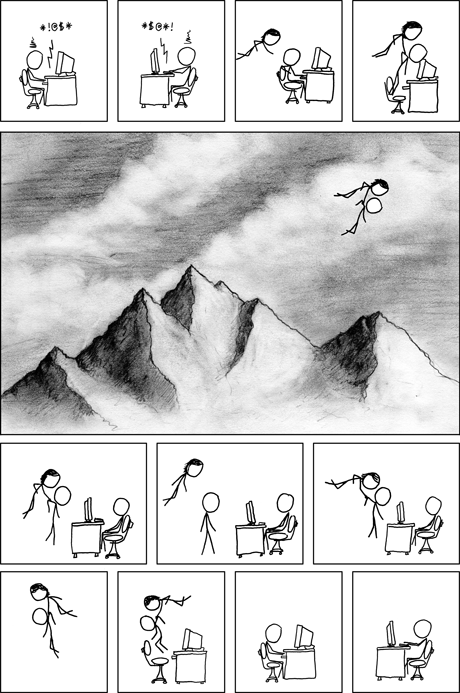A critical appraisal of various, influential understandings of the meaning and use of myth demonstrates that in contemporary anthropology myth denotes existential truth but, as was true since Anaxagoras (6th cent. B.C.) not historical truth. Since the biblical writers aim to recount real history, their literature should not be classified as myth. They do, however, borrow mythic imagery, not theology, to deepen in profundity and to heighten in transcendence the significance the symbolic motifs in salvation history, such as creation and exodus. In that connection they also polemicize against pagan myths, which run counter to Israels unique, non-mythic, faith.
Secular man, however, believes that science, especially the theory of evolution, disproves the historicity of Genesis 1-3. The church has unwittingly played into their hands by pitting the biblical narrative of mans trajectory from a pristine state through sin to death against the scientific narrative of mans ascent from simplicity to complexity through death. Those who accept both modern critical historiography and the Scriptures inerrant and infallible testimony, to be credible, must address this tension.
William Dempski, (born 1960), professor of philosophy at Southwestern Baptist Theological Seminary and Fort Worth, Texas and a prominent member of Intelligent Design, explains the fossil evidence of death before the creation of man by arguing that the eternal, non-temporal God always sees the Fall of man and within time reckoned its consequences, using death in the process of evolution, before the historical Fall. He defends this view by the analogy of the Cross. Before Christs historical crucifixion the eternal God sees the vicarious death of Christ and reckoned its consequences within time to his elect before the historical cross. Before reading Dempski this writer thought of the same resolution of Science and Scripture, but had to admit to himself, were it not for modern science, none would have guessed that scenario from the Bible. It strikes one as a rabbinic pilpul (derived from pilpel, pepper), a sharp exegesis to resolve a contradiction.
A better harmonization is a multi-perspectival view of creation. This view/theory consists of three coherent principles 1.) Genesis 1-3 cannot be interpreted woodenly and should not be over-read; 2.) darkness and sea, symbolic motifs of surd (senseless) evil in the physical world, and the Serpent, the symbolic motif of moral evil in the spiritual/moral world, are restrained in the present time between Primordial time and Endtime; and 3.) Genesis 1-3 and biblical theology give a multi-perspectival view of paradoxes, such as good and persistent evil in the world as we know it.
I. GENESIS 1-3 NOT TO BE INTERPRETED WOODENLY NOR OVEREAD
This first principal is built on three assumptions regarding the Genesis accounts of creation: 1.) as text, they cannot be read in a straightforward way; 2) as theological literature, they present a vision of salvation history for the People of God ; 3) as history, they do not attribute all death to the Fall.
A. As text cannot be read in a straightforward way
The Creation accounts cannot be read as straightforward history for at least two reasons: they are figurative and temporally incoherent. The accounts represent the main actor, God, in unrelentingly anthromorphic/anthropopathic figures. The statements God said, commanded, saw, and called prompt us to envision vocal cords, but God is spirit, not corporeal. The reference to days and to evening and morning at the end and beginning of each day according to biblical usage refers to consecutive twenty hour days. The narrative anthropomorphically represents God as a Laborer, who works in daylight and rests at night. Exodus 31:17 represents God, who never grows weary, as refreshing him on the seventh day. Mark Futato, professor of Old Testament at Reformed Theological Seminary asks, If his refreshing himself as a workman on the seventh day is an obvious anthropopathism, is it not probable that his working on the other six days is also an anthropopathism? In the second account God is represented as a Potter, fashioning the man; a Husbandman, planting a garden; and a Temple Builder, fashioning a woman. These metaphors, extended as allegories, represent historical actualities.
The temporal incoherence in the first account was recognized at least as early as Origen (185-254), centuries before the Copernican revolution: For who that has understanding will suppose that the first, and second, and third day, and the evening and morning, existed without a sun, and moon, and stars? And who is so foolish as to suppose that God, after the manner of a husbandman, planted a paradise in Eden
. In An Old Testament Theology I also call attention to the impossibility of resolving the chronological tension between the two biblical creation accounts. In the first account God causes the earth to bring forth flora on the third day and creates mankind on the sixth day. In the second account God, having planted a garden and having caused the trees to grow, puts man in the Garden and there gifts him with his bride. The garden could not have been planted on third day and have matured by the sixth day. The anthropomorphisms of planting trees and causing them to grow exclude the notions that the trees were created with apparent age or that they grew miraculously. Turning to other narratives in Genesis 1-11, R.W.L. Moberly, in an excellent chapter, On Reading Genesis 1-11, demonstrates the difficulty of reading the Cain and Abel and Flood stories in a straightforward way. The narrator, I assume, left these obvious anomalies in the text to prevent a straightforward reading and to cause his reader to reflect on what he is up to.
B. As theological literature presents a vision for the People of God
Meir Sternberg validated that three interrelated principles are at work in biblical narrative: historiographic, ideological, and aesthetic. The narrator ties the creation into real history by means of structuring the book by ten toledoths (descendants of), beginning with the first toledoth, narrating the creation of the cosmos, and terminating with the tenth toledoth, narrating the descent and settlement of Jacobs family in Egypt.
To extrapolate the theology of Genesis 1-3 one first has to consider its aesthetics. To paraphrase Adele Berlin: we dont know what a text means until we know how it means, such as through structure and climax. Consider these two aesthetic features of the two biblical creation accounts. The first reaches toward a climax with God celebrating his creation of mankind in a poem and then climaxes in the last line of chapter 1: God saw all that he had made, and it was very good (1:31). The second account likewise reaches for a climax with a poem by Adam about his wife and then climaxes with a poignant statement that they were both naked, but not ashamedthat is to say, untainted by sin. Genesis 3 presents the bouleversement of the good and unmarred creation. That narrative also reaches towards a climax with a poem and reaches its climax with man and woman permanently banished from the Garden. In sum, Genesis 1-3 depicts the creation of the world and humans as beautiful and good and the ruin of both as the tragic consequences of their hubris.
Moreover, the story is written for a later audience, Israel. All the characters, including God, speak Hebrew. Moberly likens it to all story telling, citing Shakespeare: When Shakespeare depicts all the character in Julius Caesar or Coriolanus s speaking Tudor English in the context of ancient Rome, one would be unwise to assume that Shakespeare was making a historical claim about the language of ancient Rome rather making the scenario accessible to his contemporaries. The narrator, like Shakespeare, is presenting history to communicate a perspective comprehensible to his audience. Through his visionary representation of the historical creation, he gives Israel archetypes, paradigms, lenses, to interpret her world as Gods good gift.
The vision of the creation accounts stands in marked contrast to that of Richard Dawkins, a blasphemous missionary for atheism. Dawkins devilishly tries to persuade modern man that the selfish gene uses its human host only to survive, uncaring and indifferent to the means for survival.
Nevertheless, one ought not to over read Genesis 1-3 in such a way to make it say that all surd and moral evil is due to sin. Quite the contrary; both creation accounts narrate the presence of evil in creation and before the historic Fall.
II. DARKNESS AND SEA IN SALVATION HISTORY
1. Genesis: chaos restrained
People commonly think that Genesis 1-3 narrates an unmarred, pristine creation out of nothing before the Fall and that the final stage of world history will be a restoration of the original state, Endzeit gleicht Urzeit. But that notion falsifies salvation history. Rather, as Jon D. Levenson, professor of Jewish Studies at Harvard, says: the point of the creation is not the production of matter out of nothing, but rather the emergence [out of chaos] of a stable community in a benevolent and life-sustaining The account represents the earths primordial state, before its transformation by wind and word, as senseless with regard to human well-being, blanking the reason for existence of the surd (Gen 1:2). Gods commands in connection with his dynamic ruah (wind/spirit) over the abyss transformed the uninhabitable, mysterious chaos into a cosmos, both beautiful and beneficial to mankind. However, the Creator does not banish the primordial eggshells: darkness and sea; rather he restrains the symbolic motifs of chaos by the symbolic motifs of cosmos: light and land (see Psalm 104:6-9). In the End time, however, he will eliminate, not merely restrain, the surd, primordial elements (Rev. 21:1-5, 23), implying that even the before the Fall, creation is not pristine, but threatened by evil. Turning to the Garden in the supplementary Genesis creation account, the situation is also less than pristine. The Garden where God walks is also locus of the den of the Serpent, the incarnation of moral evil, who socially destroys humankind, alienating them from God and one another. The creation is good but not perfect; surd and moral evil exists in world before the Fall.
The Flood story assures us that although God through the Flood reversed the creation back to its original state, apart from preserving his creation on Noahs ark, he will never again undo the creation in history before End of time.
2. Prophets and psalmists: chaos conquered
The Genesis accounts suppress the motif of surd and moral evil (i.e., what is opposed to life). Israels poets develop it. They use broken Canaanite myths about Rahab and Leviathan to reveal the transcendent meaning of his restraining the sea: his first salvific act, an assurance of his triumphant victory over evil. Consider Job 26:12-13 and, cited here, Psalm 89:9, 10:
You rule over the surging sea;
when its waves mount up, you still them.
You crushed Rahab like one of the slain;
with your strong arm you scattered your enemies.
Note also that the psalmist refers to I AMs vanquishing and controlling the Sea. Isaiah also used the imagery of vanquishing the sea to portray IAMs final triumph over the ultimate enemy restraining salvation history: In that day, the LORD will punish with his sword- his fierce, great and powerful sword- Leviathan the gliding serpent, Leviathan the coiling serpent; he will slay the monster of the sea (Isa 27:1). Clearly, the primordial darkness and the sea/abyss stand opposed to the God of life.
3. The maturing sage Job complains that Gods covenantal promises to bless the righteous and to curse the wicked are detached from his reality. Gods response to Jobs complaint (Job 38-41) gives more insight into the presence of evil apart from the consequences of sin. Note the literary context of Gods response. The book of Job aims, among other things, to debunk the notion that all evil is due to sin. Job is introduced as a blameless and upright man (Job 1:1), but he suffers more than any other apart from Jesus Christ. In the dialogues between Job and his three friends, (chapters 3-37) the friends, insisting that all suffering is due to sin, trump up charges against Job, but Job draws the discourse to a conclusion with two extended oaths that he is innocent. In the books narrative conclusion God expresses his anger at Jobs friends for not speaking what is right; they falsely accused Job to justify their theodicy. Christian theologians likewise, by their under-reading and over-reading of Genesis 1-3, tend to justify the presence of all evil by appealing to Adams fall. The book of Job stoutly rejects that notion.
The scenic depiction of Gods address to Job sets the context for the message: God speaks out of the eye of a tornado (38:1). God rules the deadly tornado without eliminating it, just as he restrains Satan without eliminating, him (1:12; 2:6). Gods initial questions to Job link the address with the Genesis symbolic motifs of evil: sea and darkness. “Who shut up the sea behind doors when it burst forth from the womb, when I made the clouds its garment and wrapped it in thick darkness, when I fixed limits for it and set its doors and bars in place, when I said, ‘This far you may come and no farther; here is where your proud [mine] waves haltâ? (Job 38:4-11). God protects the symbolic primordial sea, even though it opposes life, but he restrains it with the arable land that mankind can farm. Paradoxically, God both restrains and protects that which is hostile to human existence.
God now matches the motif of the primal lawless sea with lawless humans who find the darkness of night their light. In Gods dominion both light and darkness have their place. At the middle of his first address, God transitions from what is inexplicable in the cosmos from the human viewpoint to the wild and the strange animal kingdom: “Do you hunt the prey for the lioness and satisfy the hunger of the lions: when they crouch in their dens or lie in wait in a thicket? 1 Who provides food for the raven when its young cry out to God and wander about for lack of food? (Job 38:39-41). That is to say, God arranged the predator-prey syndrome independently from sin. In the second address (chapters 40-41), God torques the reality of evil by challenging Job to bring under his rule the repressive land monster, Behemoth, and the repressive sea monster Leviathan. Job cannot tame them and God does not eliminate them.
In sum, Israels poets moderate the symbolic motifs of sea and darkness from a minor key in the prose creation narratives of Genesis 1-2 to a major key in poetry. Apart from the Fall, the creation exhibits Gods restraint and rule of evil. Creation by the process of evolution, I argue, harmonizes with this biblical witness. God creates and sustains life paradoxically and mysteriously through death. If one has ears to hear, creation by the process of evolution best fits this biblical montage. Darwin and Dawkins are unwilling to allow God the freedom to rule; they insist he must rule by their dim lights.
III. BIBLICAL THEOLOGY GIVES A MULTI-PERSPECTIVAL VIEW OF REALITY
A biblical theologian notes the diverse theologies in the Bible. Christian lay persons commonly discern that the four gospels present diverse perspectives of Jesus Christs career. Human authors, living in diverse situations with sundry spiritual needs, tailor their theologies to meet those needs. The Deuteronomist, writing to bitter exiles, shapes Israels history to teach that they, not God, failed to keep covenant. The Chronicler, by contrast, writing to a discouraged post-exilic community, shapes their history to ennoble them; theirs is a noble heritage and they are the legitimate heirs of Gods covenants.
Turning to the multi-perspectives in the psalms, compare Psalms 2 and 3. In the introductory psalm God tells his newly minted king: Ask me, and I will make the nations your inheritance, the ends of the earth your possession. (Psalm 2:8). In the subsequent psalm the royal son responds: LORD, how many are my foes! How many rise up against me! Many are saying of me, God will not deliver him.” The anointed kings rule involves triumph through tragedy.
Consider the next twelve psalms, including Psalm 3. After six lament psalms (3-7), the editor of the Psalter inserts a hymn of praise, celebrating the rule of little children (i.e., the humble and trusting mortals): You have made them a little lower than the heavenly beings and crowned them with glory and honor. You made them rulers over the works of your hands; you put everything under their feet. After another six essentially lament psalms the collector inserts a psalm deploring humankinds rejection of God: The LORD looks down from heaven on the human race to see if there are any who understand, any who seek God. All have turned away, all have become corrupt; there is no one who does good, not even one (Psalm 14:2-3). Both visions are necessary to apprehend the truth.
The De Medici family nobly bequeathed to humanity marvelous art, but they did so by ignobly persecuting saints. We admire the art and deplore their sin. Truth is found in paradox, not contradiction. The Author of the Bible, using diverse human voices in diverse circumstances, orchestrates the paradoxes to present the truth. So does creation by the process of evolution present truth through paradox.
God bequeathed mankind with a good earth and at the same time retained, restrained and ruled, without eliminating, surd and moral evil. Gods process of creating through evolution entails both the symbiotic advancement of life and death; The muti-perspectival view of creation by the process of evolution is more theologically accurate than the traditional view that all surd and moral evil are due to the Fall. Creation by the process of evolution agrees with Reformed theology.




Recent Comments